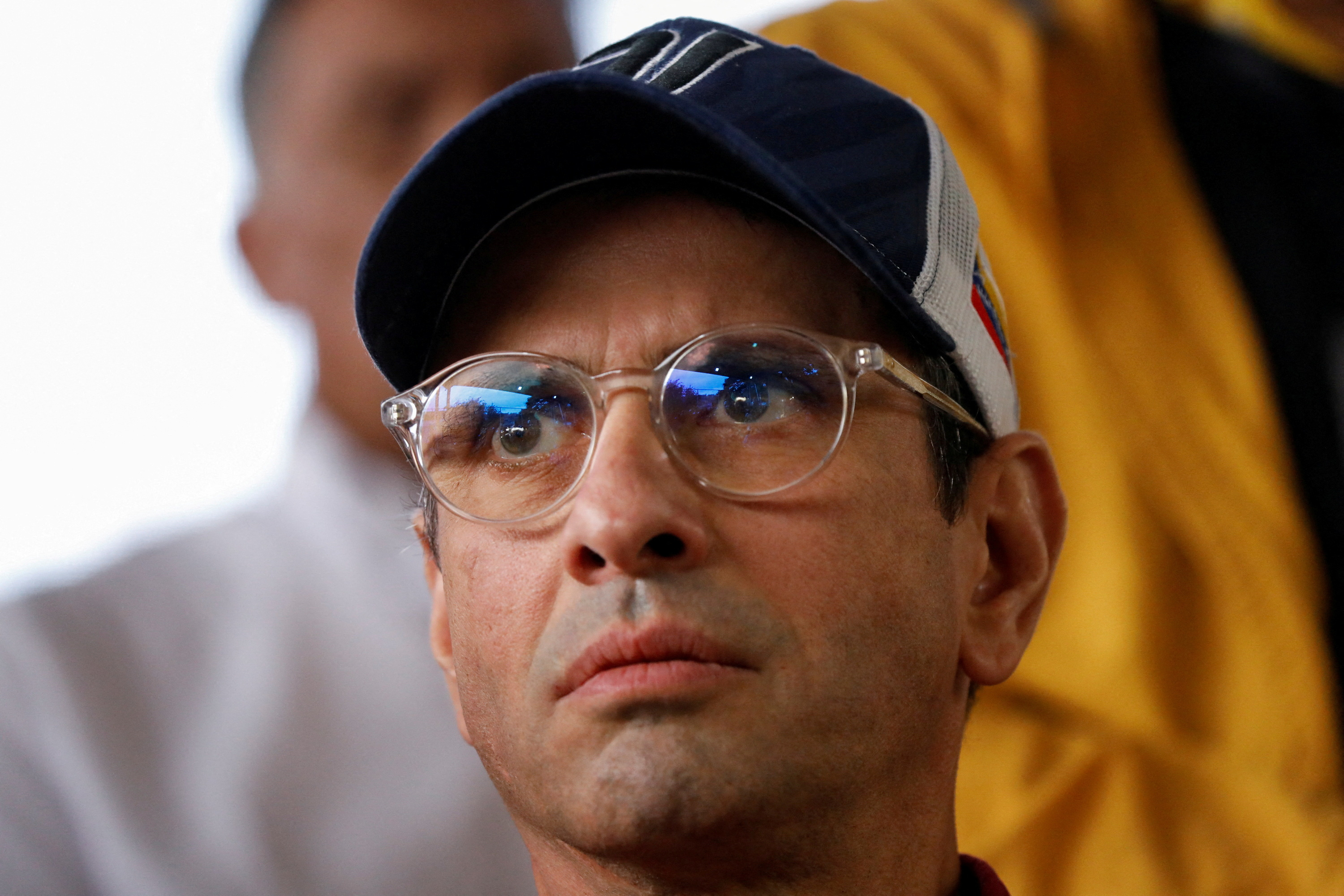Ezequiel Zamora: The Venezuelan Revolutionary Who Challenged Oligarchic Rule

Venezuelan opposition leader says party to decide his primary candidacy - Source www.reuters.com
Editor's Notes: "Ezequiel Zamora: The Venezuelan Revolutionary Who Challenged Oligarchic Rule" was published on [date]. This article is essential reading for anyone interested in Latin American history, political science, or social movements. Zamora was a complex and controversial figure, and his life and career offer valuable insights into the challenges of revolutionary movements in the developing world.
In this article, we'll explore Zamora's life and career, his political philosophy, and his impact on Venezuelan history. Zamora was a military leader who fought against the oligarchy and for the rights of the poor. He was a charismatic figure who inspired loyalty and devotion among his followers. Zamora's death in battle in 1860 marked the end of the Federal War, but his legacy continues to inspire revolutionary movements in Venezuela and beyond.
Key differences or Key takeaways
FAQ
This FAQ section provides answers to frequently asked questions about Ezequiel Zamora, the Venezuelan revolutionary who challenged oligarchic rule in the 19th century.
Question 1: Who was Ezequiel Zamora?
Ezequiel Zamora was a Venezuelan military leader and revolutionary who fought against the conservative oligarchy that ruled Venezuela during the mid-19th century. He led a peasant army in a series of campaigns that sought to redistribute land and give the poor a greater voice in government.
Question 2: What were Zamora's main goals?
Zamora's goals were to establish a more democratic and egalitarian society in Venezuela. He believed that the country's vast wealth should be shared more equitably and that the poor should have a greater say in how the country was governed.
Question 3: How did Zamora challenge oligarchic rule?
Zamora challenged oligarchic rule by leading a peasant army in revolt against the government. He also proposed a series of radical reforms, including land redistribution, universal suffrage, and the abolition of slavery.
Question 4: What was Zamora's legacy?
Zamora's legacy is that of a revolutionary who fought for the rights of the poor and oppressed. He is considered a national hero in Venezuela, and his ideas continue to inspire social movements today.
Question 5: Why did Zamora fail in his revolution?
Zamora failed in his revolution due to a number of factors, including the superior military strength of the government, the lack of support from the middle class, and the betrayal of some of his own followers.
Question 6: What can we learn from Zamora's revolution?
We can learn from Zamora's revolution that social change is possible, even in the face of great odds. We can also learn that the struggle for justice and equality is an ongoing one.

Since u/slayeryamcha challenged Adam vs Cardin, here's my contribution - Source www.reddit.com
Tips
Ezequiel Zamora, a Venezuelan revolutionary, fought against oligarchic rule in the 19th century. He advocated for land redistribution and social justice, inspiring future reform movements.
Tip 1: Understand the Historical Context
Venezuela in the 19th century was dominated by a wealthy elite who controlled land and political power, leading to widespread poverty and inequality.
Tip 2: Learn About Zamora's Vision
Zamora believed in "land and liberty," advocating for the redistribution of land to the peasants and the establishment of a more just and egalitarian society.
Tip 3: Study Zamora's Military Campaigns
Zamora's military campaigns were characterized by guerrilla warfare and the support of the common people, demonstrating the power of organized resistance.
Tip 4: Analyze Zamora's Legacy
Zamora's ideas and actions continue to inspire social movements and political reforms in Venezuela and beyond.
Ezequiel Zamora: The Venezuelan Revolutionary Who Challenged Oligarchic Rule is a valuable resource for those interested in learning more about this important historical figure.
Summary of Key Takeaways:
Ezequiel Zamora was a key figure in the struggle for social justice in Venezuela.
His ideas and actions continue to inspire movements for change.
By understanding Zamora's context, vision, and legacy, we can gain valuable insights into the challenges and triumphs of social revolutions.
Ezequiel Zamora: The Venezuelan Revolutionary Who Challenged Oligarchic Rule
Venezuelan history has featured many individuals who have risen to prominence as champions of the common people, embodying the spirit of revolt and standing up to the established order. One such figure who holds a distinctive place in this pantheon is Ezequiel Zamora, a visionary military commander, and political leader whose revolutionary ideas and actions left an indelible mark on the nation.

Google Bard: Discover the Revolutionary New Tool - Source www.i-engage.in
- Rebellious Spirit: Zamora's unwavering commitment to fighting oppression and his advocacy for the marginalized made him a formidable force against the ruling elite.
- Military Genius: His strategic brilliance and charisma as a military commander earned him victories against formidable opponents.
- Federalist Agenda: Zamora played a pivotal role in promoting federalism as a means to devolve power away from the central government.
- Social Revolution: Zamora's vision extended beyond political reform, encompassing the radical restructuring of society to uplift the poor and disenfranchised.
- Tragic End: Zamora's life was tragically cut short, but his legacy as a revolutionary icon continues to inspire future generations.
- Symbol of Justice: His name has become synonymous with the struggle for social justice and equality in Venezuela.
In conclusion, Ezequiel Zamora's multifaceted persona encompasses aspects of military prowess, political astuteness, social consciousness, and a spirit of defiance. His revolutionary ideals and actions ignited a spark of hope among the oppressed, leaving a lasting impact on Venezuelan society. As a symbol of resistance and a champion of the downtrodden, his legacy remains a testament to the indomitable spirit that drives those who dare to challenge established norms and strive for a more just and equitable world.

Golden Rule Enhanced No Background Clip Arts - Golden Rule Image - Clip - Source clipart-library.com
Ezequiel Zamora: The Venezuelan Revolutionary Who Challenged Oligarchic Rule
Ezequiel Zamora was a Venezuelan military leader and revolutionary who played a key role in the Federal War (1859-1863). Zamora was a charismatic and popular figure among the poor and disenfranchised, and his revolutionary ideology challenged the oligarchic rule that had dominated Venezuela for decades.

Salestable Introduces Revolutionary Sales Readiness Platform for Small - Source www.getnews.info
Zamora's rebellion was ultimately unsuccessful, but it had a profound impact on Venezuelan history and laid the foundations for the country's future democratic system.
Zamora's revolutionary ideology was based on the principles of federalism and social equality. He believed that Venezuela should be a federation of autonomous states, and that all citizens should have equal rights and opportunities. Zamora's ideas were inspired by the French Revolution, and he was also influenced by the writings of Simón Bolívar, the father of Venezuelan independence.
Zamora's rebellion began in 1859, when he organized a group of peasants and ranchers to fight against the oligarchic government. Zamora's forces were initially successful, and they quickly gained control of several provinces. However, the government eventually managed to defeat Zamora's rebellion, and he was killed in battle in 1860.
Despite his death, Zamora's legacy lived on. His ideas inspired future generations of Venezuelans to fight for democracy and social justice. In 1999, Hugo Chávez, the president of Venezuela, adopted Zamora as a symbol of his own revolutionary movement. Chávez's government has implemented a number of social programs that are based on Zamora's principles, and Zamora's image is now featured on Venezuelan currency.
Ezequiel Zamora was a complex and controversial figure, but there is no doubt that he was a major force in Venezuelan history. His revolutionary ideology challenged the oligarchic rule that had dominated Venezuela for decades, and his ideas continue to inspire Venezuelans today.
Table: Key Insights
| Concept | Description |
|---|---|
| Federalism | Zamora believed that Venezuela should be a federation of autonomous states. |
| Social equality | Zamora believed that all citizens should have equal rights and opportunities. |
| Legacy | Zamora's ideas continue to inspire Venezuelans today. |